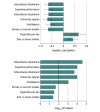Interaction Testing and Polygenic Risk Scoring to Estimate the Association of Common Genetic Variants With Treatment Resistance in Schizophrenia
- PMID: 35019943
- PMCID: PMC8756361
- DOI: 10.1001/jamapsychiatry.2021.3799
Interaction Testing and Polygenic Risk Scoring to Estimate the Association of Common Genetic Variants With Treatment Resistance in Schizophrenia
Abstract
Importance: About 20% to 30% of people with schizophrenia have psychotic symptoms that do not respond adequately to first-line antipsychotic treatment. This clinical presentation, chronic and highly disabling, is known as treatment-resistant schizophrenia (TRS). The causes of treatment resistance and their relationships with causes underlying schizophrenia are largely unknown. Adequately powered genetic studies of TRS are scarce because of the difficulty in collecting data from well-characterized TRS cohorts.
Objective: To examine the genetic architecture of TRS through the reassessment of genetic data from schizophrenia studies and its validation in carefully ascertained clinical samples.
Design, setting, and participants: Two case-control genome-wide association studies (GWASs) of schizophrenia were performed in which the case samples were defined as individuals with TRS (n = 10 501) and individuals with non-TRS (n = 20 325). The differences in effect sizes for allelic associations were then determined between both studies, the reasoning being such differences reflect treatment resistance instead of schizophrenia. Genotype data were retrieved from the CLOZUK and Psychiatric Genomics Consortium (PGC) schizophrenia studies. The output was validated using polygenic risk score (PRS) profiling of 2 independent schizophrenia cohorts with TRS and non-TRS: a prevalence sample with 817 individuals (Cardiff Cognition in Schizophrenia [CardiffCOGS]) and an incidence sample with 563 individuals (Genetics Workstream of the Schizophrenia Treatment Resistance and Therapeutic Advances [STRATA-G]).
Main outcomes and measures: GWAS of treatment resistance in schizophrenia. The results of the GWAS were compared with complex polygenic traits through a genetic correlation approach and were used for PRS analysis on the independent validation cohorts using the same TRS definition.
Results: The study included a total of 85 490 participants (48 635 [56.9%] male) in its GWAS stage and 1380 participants (859 [62.2%] male) in its PRS validation stage. Treatment resistance in schizophrenia emerged as a polygenic trait with detectable heritability (1% to 4%), and several traits related to intelligence and cognition were found to be genetically correlated with it (genetic correlation, 0.41-0.69). PRS analysis in the CardiffCOGS prevalence sample showed a positive association between TRS and a history of taking clozapine (r2 = 2.03%; P = .001), which was replicated in the STRATA-G incidence sample (r2 = 1.09%; P = .04).
Conclusions and relevance: In this GWAS, common genetic variants were differentially associated with TRS, and these associations may have been obscured through the amalgamation of large GWAS samples in previous studies of broadly defined schizophrenia. Findings of this study suggest the validity of meta-analytic approaches for studies on patient outcomes, including treatment resistance.
Conflict of interest statement
Figures




References
-
- Birnbaum R, Weinberger DR. Special article: translational science update. pharmacological implications of emerging schizophrenia genetics: can the bridge from ‘genomics’ to ‘therapeutics’ be defined and traversed? J Clin Psychopharmacol. 2020;40(4):323-329. doi: 10.1097/JCP.0000000000001215 - DOI - PubMed
Publication types
MeSH terms
Grants and funding
- 052247/WT_/Wellcome Trust/United Kingdom
- R01 MH104964/MH/NIMH NIH HHS/United States
- G0500817/MRC_/Medical Research Council/United Kingdom
- MR/L011794/1/MRC_/Medical Research Council/United Kingdom
- U01 MH109528/MH/NIMH NIH HHS/United States
- R01 MH124873/MH/NIMH NIH HHS/United States
- 042025/WT_/Wellcome Trust/United Kingdom
- R01 MH123451/MH/NIMH NIH HHS/United States
- G0801418/MRC_/Medical Research Council/United Kingdom
- R01 MH077139/MH/NIMH NIH HHS/United States
- PDF-2018-11-ST2-020/DH_/Department of Health/United Kingdom
- WT_/Wellcome Trust/United Kingdom
- MC_PC_17212/MRC_/Medical Research Council/United Kingdom
- MR/L010305/1/MRC_/Medical Research Council/United Kingdom
- MR/P005748/1/MRC_/Medical Research Council/United Kingdom

